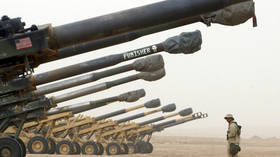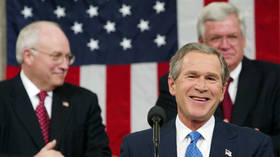Fyodor Lukyanov: 20 years after Bush declared ‘mission accomplished,’ it’s clear that Iraq was the graveyard of American ambition

Twenty years ago, in May 2003, then-US President George W. Bush landed on the deck of the Abraham Lincoln aircraft carrier in the Persian Gulf and declared “mission accomplished.” The Texan announced the liberation of Iraq and the end of active combat, in effect a military victory.
This was technically true. Baghdad was under American control, and although Iraqi President Saddam Hussein had escaped, he would be captured six months later. In fact, the invasion by Washington and its coalition had destroyed Iraqi statehood, led to a bloody civil war, the disintegration of the country, a dramatic shift in the balance of power in the region (not in the Americans’ favor, by the way), and was the root cause of the series of upheavals that engulfed the Middle East in the 2000s and 2010s.
Much has already been said about the war in Iraq, and we will not repeat it. We will simply note that only the most stubborn neo-conservatives now defend it, justifying the expediency of the action under what is now well known to have been a false pretext. Even their like-minded but less radical supporters admit that the intervention was unsuccessful and unnecessary. Nevertheless, most of the initiators of the campaign – former President Bush himself, his inner circle of Dick Cheney, Paul Wolfowitz, and Richard Perle – are comfortably retired, and Donald Rumsfeld left this world, without facing any repercussions, two years ago.
Looking back at the events of that time, it is important to assess the role of the invasion in modern history. Iraq was the culmination of US efforts to assert complete and unchallenged hegemony. Whatever the motives for the decision to go to war (and they ranged from the utterly mercenary to the personal and dogmatically idealistic), the political expediencies could not be concealed. The events of September 11, 2001, when America was attacked by a strange and seemingly unknown enemy, caused a shock. It was necessary to show that Washington was still capable of doing whatever it deemed necessary – even if it did not have the support of much of the world and of its key allies. And so it did. Bush’s aircraft carrier appearance was intended to shore up the status quo.
What happened next, however, was that Iraq actually experienced the opposite: the limits of American capabilities and an eventual withdrawal in the face of an almost uncontrollable sectarian-political conflict.
It was not immediate, but it was already irreversible. Bush’s second term, which he won despite widespread dissatisfaction with the situation in Iraq in particular, was a period in which Washington’s ambitions were slowly relaxed. It should be remembered that the first term, in addition to Iraq and Afghanistan, included ‘color revolutions’ in countries bordering Russia (Georgia and Ukraine), which were also part of the general desire for domination.
America’s continued presence in the Middle East has become increasingly reactive rather than proactive, with Washington increasingly having to deal with the consequences of its own policies. ‘The Arab Spring’ initially generated enthusiasm and even revived an instinct for interventionism, but quickly became bogged down in confusing realities. The emergence of Islamic State potentially threatened immediate American interests and forced Washington into firefighting. In the end, however, it was put out by everyone, not just those who started it.
The Russian military operation in Syria in 2015 was, to some extent, the end of a phase that began in 2003. In the US, there was a process of rethinking the importance of the Middle East, either openly or not so openly. It began under Obama and continued under Trump. The latter was clearly weighed down by great power commitments in the region, but chose two anchor points, Israel and Saudi Arabia. Paradoxically, it was with this pair that relations were openly squeezed under Biden, even though he had seemingly promised to restore US leadership in this part of the world. As a result, the US presence today is increasingly symbolic and, above all, unclear in its objectives.
In fact, the twists and turns of American attitudes towards the Middle East are best summed up by the surprising (and beneficial) effect that its distancing has had on the region. The view has long been that this part of the world is a lost cause due to a confluence of circumstances. The peoples and states themselves are supposedly condemned to endless squabbling, while external forces influence the situation in one way or another. It wasn’t ideal, but there seemed to be some sort of logic.
The experience of the last few decades proves the opposite. The main problems are the result of external interference. And when, for one reason or another, regional actors are left to their own devices, they begin, by trial and error, to navigate their way towards normalization. This is still extremely difficult, but at least it’s in everyone’s interest because it affects everyone directly.
The American invasion of Iraq was both the apotheosis of post-Cold War American expansionism and a testament to its downfall. It is certainly not only a lesson for Washington, but also an illustration of the changes in the world. The era of superpowers is over. The world will be organized differently.















